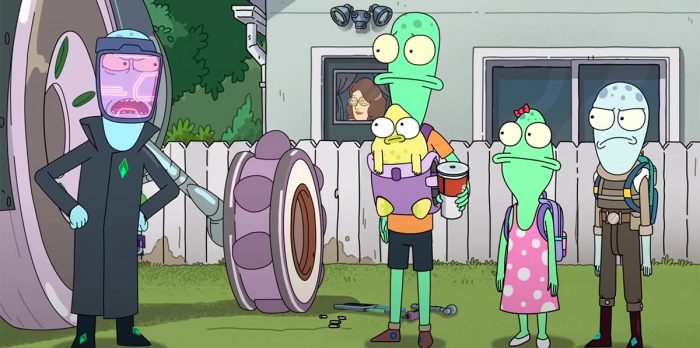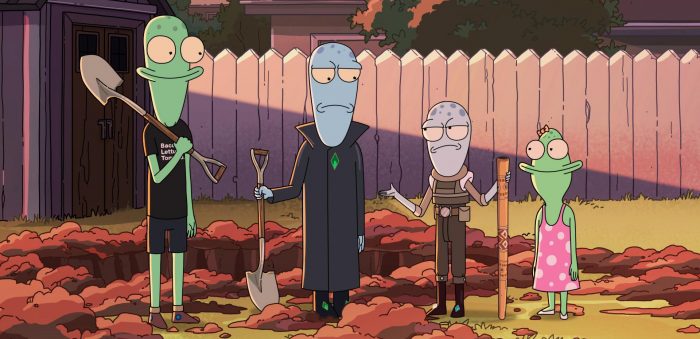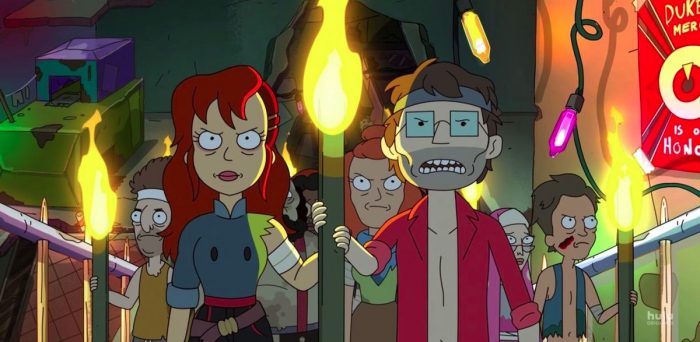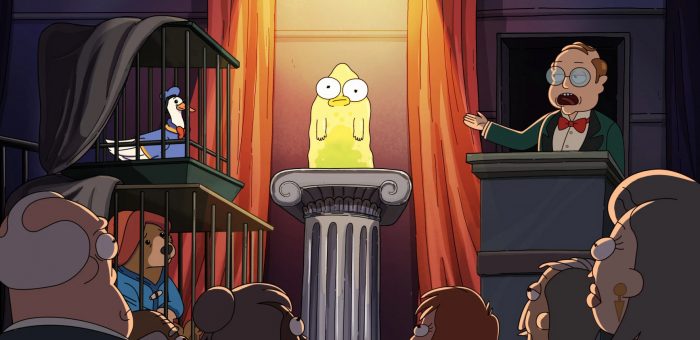‘Solar Opposites’ Interview: Mike McMahan on ‘Rick and Morty’ Comparisons, Pop Culture References, The Wall & More

The first season of the new animated series Solar Opposites recently debuted on Hulu. Rick and Morty co-creator Justin Roiland and series writer Mike McMahan have teamed up for the new show about a group of aliens who were forced to abandoned their destroyed homeworld and have been sent to Earth to wait for a living super computer called The Pupa to evolve and terraform the planet, leaving them to live suburban lives in America.
Solar Opposites is a laugh riot, as you can read in my review, so I was very eager to talk to co-creator Mike McMahan about the inception of the show, some of its influences, the surprising and shocking subplot, and what’s in store for the future of the animated series. You can read our full Solar Opposites interview below, but beware of major spoilers for the end of the show if you haven’t yet sat down to watch all eight episodes of the first season
Even though the situation everyone is in right now is less than ideal, it must be somewhat encouraging that people are streaming a lot of content right now and have plenty of time to watch Solar Opposites on Hulu.
Yeah, it’s really exciting. I wish I would have chosen my words more carefully when I had the genie. I would rather there be no pandemic and have people watch the show. But all joking aside, it is really exciting. The show brings me a lot of joy, and I’m hoping that it’s a bright spot for a lot of people to have something new where they don’t know what they’re getting.
The show feels like it has a tone and style that’s similar to Rick and Morty, which you wrote on previously, but it feels like it’s a little more deranged and raunchier. Is that something that you and Justin set out to do since you have a little more freedom when it comes to vulgarity because you’re on streaming instead of cable?
I think the artistic style, what you’re seeing on screen, does look like Rick and Morty. To me it looks like Justin Roiland’s art, and Rick and Morty looks like his art, and so do his games. When I first met Justin, he had been developing other shows in his style, but you can’t ignore the gravitational pull of something as awesome as Rick and Morty.
We really love Rick and Morty, but it centers around Rick. And there’s no Rick on our show. We really wanted it to feel like more of a classic sitcom that goes off the rails pretty quickly instead of being a sci-fi adventure show. I love Dan Harmon, and I think Rick and Morty is a great expression of his comedic point-of-view, but Solar Opposites is more about the things that get me excited. I’m a big TV geek, and I wanted to do something that felt more like classic sitcoms, something that felt aware that it was a TV show in a suburban American setting.
I think the thing you’re seeing, the crazy part of it, is that whenever you start from a sort of emotional place, we like to push it and keep ahead of the audience to be as surprising as possible. And that just means you get pretty crazy sometimes.

Yeah, you can definitely feel the sitcom influence, and then something insane throws that into the direction of extreme sci-fi violence and twisted zaniness. Were there any specific examples, either on the sitcom or sci-fi side, that influenced the direction of the show?
From a distance, we wanted the show to feel like, look like, and start like a classic, broad, animated, family network show. Family Guy, The Critic, Futurama, all of these things that I grew up with. Once you have that baseline, it should feel like this could air between The Simpsons and Family Guy or Bob’s Burgers and it wouldn’t seem out of place until about three minutes into the episode. You look at shows like Seinfeld, Friends, Home Improvement, and Frasier, and try to find identifiable, familiar places to start and then just organically get crazier and crazier as the aliens don’t follow any of the rules or know any of the things those characters do in those other shows.
One of the more interesting things about Solar Opposites is that the aliens have been on Earth for a year by the time the show starts. So a lot of the comedy comes from people just being inconvenienced by them rather than shocked that aliens exist. And the aliens themselves don’t have to get acquainted with what life is like on Earth. Can you talk about how that approach came about?
Aliens in America is not a new idea for a show. One of the things we never wanted to deal with, what we’ve seen a million times, is aliens hiding from the FBI or having to fit in or worrying that they’re going to get discovered. That’s not the kind of stories we wanted to tell. ALF and 3rd Rock from the Sun and a million other things have covered that. We still love those shows, but that’s just not what we wanted to do. I think you just put it in a great way. Instead of being worried that they’re around aliens, the humans in the show just think they’re weird and inconvenient. Since that’s how people make me feel all the time, it’s a lot easier to channel stories that feel more personal towards our characters. I’ve never been worried that the FBI is going to try to find out what my heart looks like, so I don’t feel like I need to write a character who’s always worried about that.

The dynamic between the characters is great because they feel like a family, but in a weird way. Terry and Corvo especially have an interesting chemistry because sometimes they feel like brothers, other times they feel like gay dads. Obviously they’re aliens so they don’t have the same sexual definitions and norms that humans do, so was that kind of fluidity intentional?
From the get-go, we wanted to set up the family unit so that initially, they’re on a mission into space. So the kids are their replicants, who aren’t reproduced like humans. They cut off a piece of their body like a fingertip, plant it in alien soil, and that’s how they got Yumyulack and Jesse. So we wanted it to feel like, at some point within the first year on Earth, before you see the first episode, they landed on Earth, watched a bunch of sitcoms and thought, “Oh, this is how people live on Earth. The two adults sleep in one bed, and the kids go to school. We’re gonna do our alien mission stuff, but we’re also gonna do this to fit in.”
Because the aliens are such a blank slate for comedy, if we need an episode where Terry and Corvo are best friends, then we can do that. If we need an episode where it feels like they’re co-parents or co-husbands, we can do that. They don’t define anything by the same sexuality or social pressures that humans have to. It felt like it opened more doors for us to never nail down exactly what their relationship other than they clearly have love for each other, and we’re just defining that in different ways all the time. Never having to define it felt natural and great. When you’re writing stories, it turns out you don’t have write stories based on other people’s definition of what love is or how to express it. We’re not saying that we’re champions of understanding that stuff very well, because we’re just two nerdy comedy writers with a show about aliens, but we’re freeing ourselves of any kind of societal tropes about two husbands, or two best friends, or two mission analogs. It let us have fun with how other people adhere to definitions like that. So sometimes they’re best friends, sometimes they give each other a congratulatory kiss. Other times they’re arguing about how to take care of the replicants and get them to school. It really just depends on the episode.
I love the idea of the aliens getting their frame of reference for what a family is from sitcoms, and because of that, the aliens seem very well-versed in pop culture for only being on Earth for a year. I found myself wondering if there were any rules that you established about how much they can know about pop culture of the past, such as how to utilize their knowledge, figuring out when references don’t work, and things like that.
The pop culture references that the aliens are allowed to know is basically anything you think they could have consumed in a year of having basically nothing to do. We’re all experiencing that right now. How many people have you seen being like, “I’ve gotten to the end of Netflix.” To me, there are really no rules about what the aliens can know because they have access to all human content at their fingertips just like we do.
From a writing point-of-view, we really tried to keep it so that Corvo claims he has less of an interest in human stuff, but Terry has seen everything. Every once in a while we admit that Corvo has seen a lot of movies and stuff too, but the friction between them comes from the fact that Terry really loves all media. He’s a fan, and a stan, and he ships. He’s the ultimate TV consumer. Corvo has seen some of the stuff, but Terry still grates on him because he’s seen so much more. If any audience member is concerned with the amount of media they’ve consumed, just think of Johnny-5 from Short Circuit drilling through books. That’s how Terry drills through the Harry Potter movies.
How far out do you have the story arc planned, for both the alien mission and what’s going on inside The Wall?
We have stuff planned out for about three or four seasons on both sides. We have stuff that we know we want to do with the mission of the aliens on Earth and expanding our understanding of their relationship with The Pupa and meeting other aliens who are on similar missions and seeing how that’s going. We’re touching on a little bit of that in season two.
At the same time, The Wall story we have even more planned out. When we first pitched the story to Hulu, we flat out said that we want this many episodes to have Wall stories, and we know we want to give the show over to The Wall story for an entire episode. Hulu was completely supportive, and we actually requested that the season dropped all at once for binging because we didn’t want anybody to pick up an episode in the middle of the season and not have the context of what was happening in The Wall and what we were crafting there. I’m a huge geek, and I’ve never gotten to write a straight-up sci-fi survival story. So not only did we have all of The Wall stuff for the entire first season planned out, but we’ve also got tentpole, structural things that we knew we wanted for The Wall in a second, third, and fourth season, if we got picked up that far. I love the first season Wall stuff, but where that story goes in the second season has some of my favorite episodes. It will be completely surprising.

Escape from New York is name-dropped as the key frame of reference for The Wall, but what are some of the other influences you had for that part of the story?
Definitely Escape from New York, Mad Max, War of the Roses, Game of Thrones, Lord of the Rings. But also a lot of young adult, 1970s sci-fi literature where people are trapped in a mysterious world. There’s a book series called Riverworld which is about people who wake up after dying, and they have to navigate this new world, and there’s sort of after-life kind of storytelling in The Wall. There’s a book called Wool by Hugh Howey, which is about people who live in a silo underground and how you have to rebuild society like that. There’s a lot of stuff like that. The movie Cube, from the 90s, I think. I love that movie. Different people who are stuck together and find themselves in a sci-fi environment.
As for the structure of The Wall story, I really wanted to do an animated show with what I liked about the structure of The Wire. You have the main crew in The Wire, cops looking for bad guys, drug busts. But then every season, you’d get a glimpse at the dock workers or the newspaper guys or the teachers. You would always have this new perspective that’s growing with each episode. And that’s where the structure of inserting The Wall into the show was inspired by.
Because you have that episode which takes place entirely in The Wall, you basically have two season finales, and they’re very much separate from each other. As these stories continue, will they become more intertwined or will they remain mostly tangential to each other where the aliens only play a small part in what’s going on inside The Wall?
I don’t want to give too much away about The Wall, but the world of the people who are in The Wall is one that exists and operates separately from the replicants. However, there are things that happen on the aliens side of the episodes that do have effects on The Wall. You’ll be seeing in the second season that Jesse and Yumyulack almost treat the wall a little bit like TV. They’re studying humans and learning from them and putting their enemies in there.
The fun of it, to me, is never really bending on the fact that the people in The Wall treat the situation as seriously as they would real life drama. Even though they’re drinking out of thimbles arguing over candy they’re bartering with, for them it’s life or death. Trying to keep that story growing in an unexpected way and in a really emotional, dramatic way is what we do in the second season and what we tried to do in this first season as well.
It works so well, because The Wall is treated so seriously, and then you have the alien side when Jesse cleans out part of the wall, and Molly the mouse is thrown away so carelessly and you feel so sad about it.
That mouse is the saddest thing we’ve ever written, and it just kept getting sadder from animatic to color to adding the music. Oh, the music in The Wall too! It’s an entirely original score by our composer Chris Westlake. All the other episodes are your standard cable animated shows synth kind of stuff. But for The Wall episode, Fox budgeted us for a 60-person orchestra and we recorded it live at the Fox soundstages where they do movie scores and stuff. It’s a beautiful score and such a ridiculous episode that it really feels like something special to me.
It feels so epic, and that episode is certainly a milestone for the season that makes it stand out from being just another animated sitcom. I love it.
Thanks, man. The show kind of comes from us asking, “What have we never gotten to do before?” Hulu is giving us a chance to do things we’ve never done before and support us with it. They still give us notes, they still keep us on track, and they make sure we’re still being honest with out emotional stories. But if we wanna take a swing at something, they back us up. So we really tried to do something special with it, and I’m really proud of what we did.

One of the other things that’s great throughout the episodes is the presence of The Pupa. It’s not always prominent, but it does have some side adventures, and he can be spotted in the background doing weird things here and there. Will The Pupa start to have bigger role as he evolves in the coming seasons, or will he remain a side character?
The Pupa exists for a lot of different storytelling mechanisms. He was originally created based upon me having a baby at the time we were developing the show and realizing that you both love your baby and fear it, you’re scared of it and confused by it at all times. That’s why we wanted The Pupa to seem like a dog, maybe like an unknowable mystery, but at the same time, it’s something that’s cute and funny and can have these little non-verbal stories that are reminiscent of the Sergio Aragonés comics in the margins of MAD Magazine that I used to read growing up. I would have the artists pitch me on things that The Pupa is doing in the background, and for an audience member who’s looking for it, we’ll make them laugh.
But sometimes we’d broaden the scope of The Pupa and tell weird little side adventures that the aliens don’t really know about. At the end of the day, he’s part of the family, but what you and the aliens don’t know, because Terry was in charge of knowing this and then didn’t pay attention, is when and how it’s going to evolve, consume us, and terraform the planet. That’s pretty much what human children to do their parents to some extent. There are things you will see each season as far as seeing a change in The Pupa, and there is a story about it you will be tracking, but The Pupa is a very slow burn. We aren’t writing a show that we want to burn something like that so quickly because we like who The Pupa is before it evolves, and we like the uncomfortable stasis it has with Terry and Corvo and the replicants. We want to tell as many stories as we can. We have a million ideas for how the family and the mission is right now, and you will be seeing changes in The Pupa each season, but not so much that it dramatically changes the show until you least expect it.

Star Trek: Lower Decks
You’re also working on Star Trek: Lower Decks, an animated series for CBS All Access that takes a comedic approach following the lower end of a crew on a Starfleet ship. Can you talk about how you’re making Star Trek funny while respecting the canon and belittling the franchise, which is what you’ve said is your goal for the series?
I’m a huge Star Trek fan, and nobody needs a Star Trek comedy that made fun of Star Trek or punched down on Star Trek, nor was I interested in doing that that. I was interested in writing a Star Trek that could be canon, that follows the rules of other Star Trek shows that I loved, and has everything that you love about Star Trek, including the way you tell stories. But I’m a comedy writer. I’m never gonna write a serious Star Trek, so the way that we handled it is it’s on a ship that isn’t the capital ship. It’s not about the bridge crew. It’s about the lowest officers on that ship. But when we’re breaking stories for the lower decks, every episode also has a proper Star Trek episode that’s happening to the bridge crew, and our lower deckers aren’t involved in it. However, you can’t have a big sci-fi thing happening on a starship and not have it effect them because that’s their whole world. So if you’re watching Lower Decks, you’re getting a full Star Trek episode from the perspective of people who are having their own social and emotional stories and their own sci-fi stories, but they just aren’t on the bridge. They don’t have the information the bridge is getting, and they don’t have the responsibility.
On top of that, a big thing that was important to me was figuring out how do we comedically access these characters. How can these characters be funny and not break Star Trek? You can’t have a Morty in Star Trek. You can’t just have a stupid person in Starfleet, otherwise it breaks the aspirational paradigm of what humanity is like in Starfleet. So our leads are foils for each other, but they’re very much ingrained in Star Trek.
You have Ensign Beckett Mariner, who is sort of like our Tom Cruise/Maverick, where she’s amazing at Starfleet stuff, and she’s incredibly knowledgeable, but she just hates following the rules and she bristles at the military structure. She wants to do whatever she wants. She’s kind of like Captain Kirk if Kirk wasn’t a captain and didn’t have the power. Kirk would follow his gut, and she followers her gut. Then, Ensign Brad Boimler also knows everything about sci-fi stuff, and is also an amazing Starfleet crew member, but he’s so by-the-book and so burdened by following the rules that he can’t follow his gut. So the comedic friction there is that they both want the same thing, they’re both good at this stuff, but emotionally and from a human level, they’re completely different about how they do it.
That’s where we’re finding the comedy on Lower Decks. Most of it is coming from the same things that Star Trek has always investigated. Yes, it’s the future of humanity, but what defines us as humans? Star Trek has always had comedy in it. Every series of Star Trek has funny characters, funny episodes, and those always live in the B-stories for the most part. That, to me, is what I love about Star Trek. So it’s really taking that aspect of it and letting that shine. I can’t wait for you guys to see it, because it’s one of my favorite things I’ve ever made. It feels like it fell out of another dimension in the 90s where they were making a funny Next Generation era show.
The post ‘Solar Opposites’ Interview: Mike McMahan on ‘Rick and Morty’ Comparisons, Pop Culture References, The Wall & More appeared first on /Film.
from /Film https://ift.tt/2B0Uf1l
No comments: